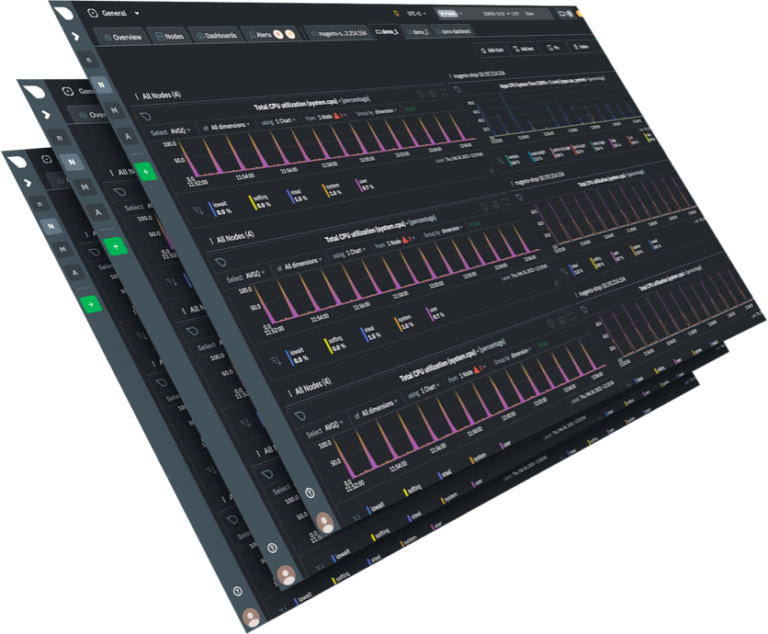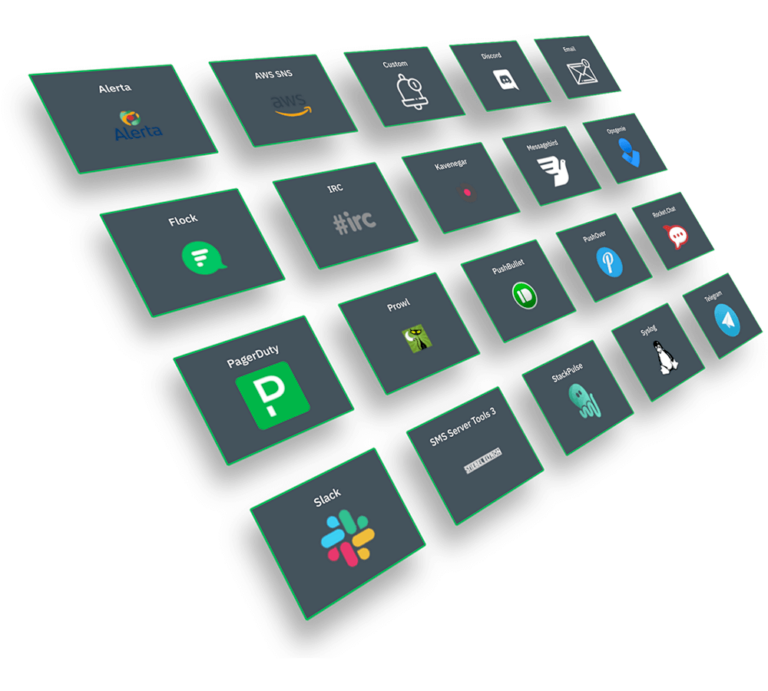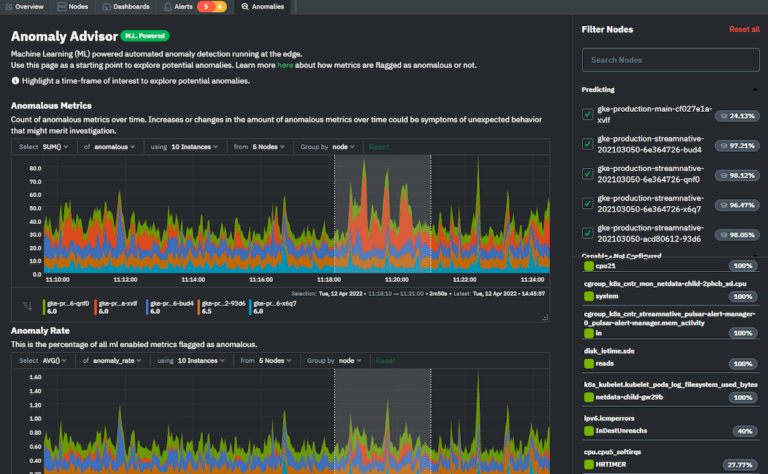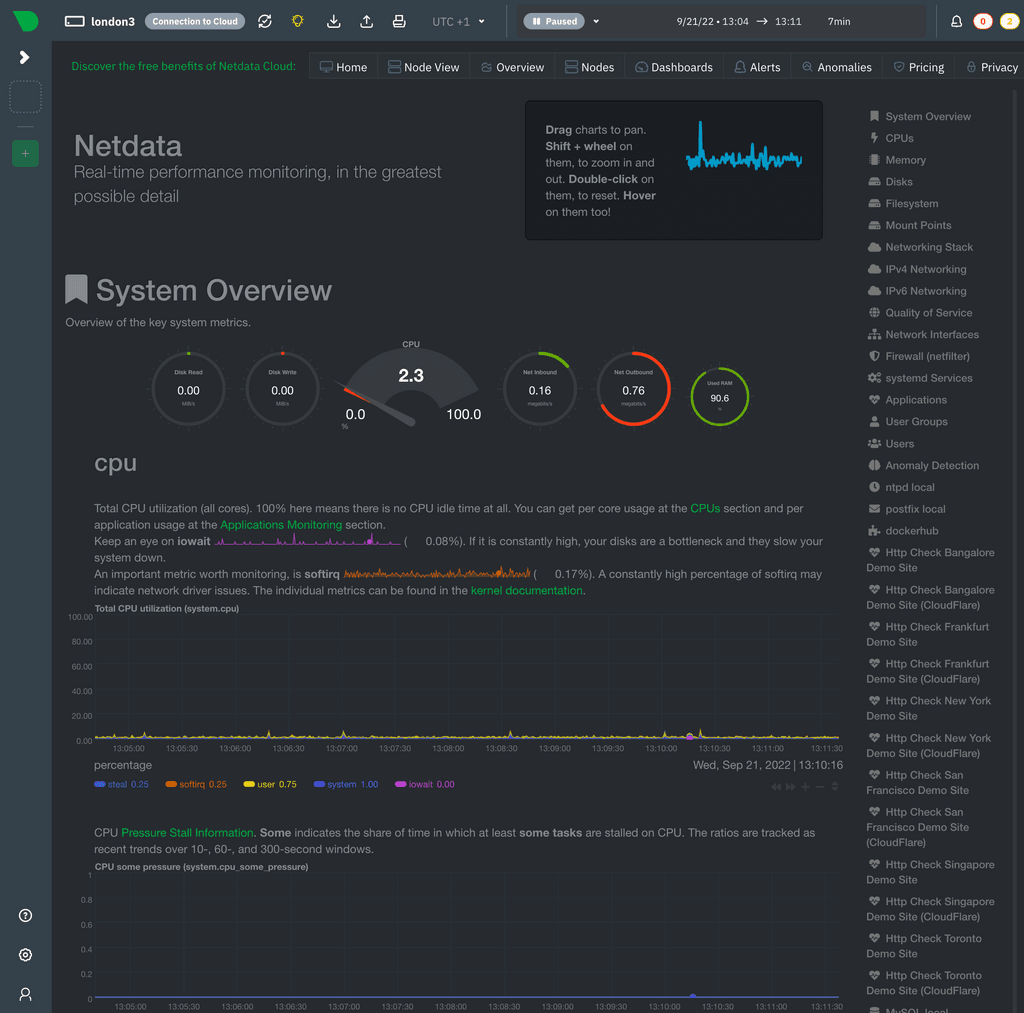netdata - real-time monitoring
-
@imc67 said in netdata - real-time monitoring:
I’m not familiar (yet) with creating Cloudron apps.
Have you read the packaging tutorial?
(which imho needs to be easier to find from the main Cloudron website):https://cloudron.io/documentation/custom-apps/tutorial/
@imc67 said in netdata - real-time monitoring:
I’m currently missing real-time insights in ie. CPU, network I/O, etc
I get all those on my Hetzner cloud over in the Hetzner console. Perhaps your server/ VPS provides this info too?

@jdaviescoates said in netdata - real-time monitoring:
Have you read the packaging tutorial?
(which imho needs to be easier to find from the main Cloudron website):
https://cloudron.io/documentation/custom-apps/tutorial/I blindly followed the tutorial and it result this:
https://hub.docker.com/repository/docker/jodumont/netdata
and the repo is there: https://git.cloudron.io/jodumont/netdata-app -
@jdaviescoates said in netdata - real-time monitoring:
Have you read the packaging tutorial?
(which imho needs to be easier to find from the main Cloudron website):
https://cloudron.io/documentation/custom-apps/tutorial/I blindly followed the tutorial and it result this:
https://hub.docker.com/repository/docker/jodumont/netdata
and the repo is there: https://git.cloudron.io/jodumont/netdata-app@JOduMonT said in netdata - real-time monitoring:
https://hub.docker.com/repository/docker/jodumont/netdata
and the repo is there: https://git.cloudron.io/jodumont/netdata-app@nebulon does this count for "a free license for Your App Community" ?
-
@JOduMonT it seems you have just forked the tutorial app and copied things from the upstream netdata Dockerfile. If you actually want to create a Cloudron app package for netdata, then you would have to revisit the package files. For example
VOLUMEin Dockerfile is not supported, also none of the CloudronManifest.json meta information seems to have been applied to netdata. Also healthcheck is not implemented.
Generally it may be nice to have netdata if it provides useful information and is actually be packaged for Cloudron. -
@JOduMonT it seems you have just forked the tutorial app and copied things from the upstream netdata Dockerfile. If you actually want to create a Cloudron app package for netdata, then you would have to revisit the package files. For example
VOLUMEin Dockerfile is not supported, also none of the CloudronManifest.json meta information seems to have been applied to netdata. Also healthcheck is not implemented.
Generally it may be nice to have netdata if it provides useful information and is actually be packaged for Cloudron.@nebulon said in netdata - real-time monitoring:
@JOduMonT it seems you have just forked the tutorial app and copied things from the upstream netdata Dockerfile. If you actually want to create a Cloudron app package for netdata, then you would have to revisit the package files. For example VOLUME in Dockerfile is not supported, also none of the CloudronManifest.json meta information seems to have been applied to netdata. Also healthcheck is not implemented.
Generally it may be nice to have netdata if it provides useful information and is actually be packaged for Cloudron.thanks for the guidance,
it was my first 10 minutes
I'll have more time next week. -
@JOduMonT it seems you have just forked the tutorial app and copied things from the upstream netdata Dockerfile. If you actually want to create a Cloudron app package for netdata, then you would have to revisit the package files. For example
VOLUMEin Dockerfile is not supported, also none of the CloudronManifest.json meta information seems to have been applied to netdata. Also healthcheck is not implemented.
Generally it may be nice to have netdata if it provides useful information and is actually be packaged for Cloudron. -
-
 I imc67 referenced this topic on
I imc67 referenced this topic on
-
@marcusquinn Yeah, that demo does look very good.
-
@imc67 @marcusquinn are you still using netdata? If so, are you using the selfhosted dashboard or the dashboard in the cloud ?
Also, in the demo that marcus linked, it says "Your Agents are open by default. Secure them easily with Netdata Enterprise Agent." at the top. What does this mean? I thought agents are reporting something and you cannot query agents. Why are they open by default and can they only be secured with enterprise version?
-
@imc67 @marcusquinn are you still using netdata? If so, are you using the selfhosted dashboard or the dashboard in the cloud ?
Also, in the demo that marcus linked, it says "Your Agents are open by default. Secure them easily with Netdata Enterprise Agent." at the top. What does this mean? I thought agents are reporting something and you cannot query agents. Why are they open by default and can they only be secured with enterprise version?
@girish I still use Netdata installed on all three Cloudron servers + 3 RPI's.
On Cloudron I access them via AppProxy so they are secured. Then all the Agents are currently connected to the Netdata Cloud and I can see them all in one dashboard.
I don't know what Enterprise Agent is?
As far as I know agents are streaming data to the local webGUI or to the Netdata Cloud GUI.
-
@cvachery we have to revisit this. We got blocked by the possibly confusing Login button appearing on the top right after logging in. I guess we have to live with it?
-
-
I would be delighted to see Netdata in Cloudron.
I have been using Netdata for many years now for about 50 servers.
My experience:
Netdata is a great tool for analysing the load on a machine, in real time or in the aftermath of a problem. Netdata itself is relatively resource-efficient.
Initially, I was irritated by the fact that the UI is very much geared towards using netdata.cloud. For example, there is a conspicuous "log in" button that takes you directly to the cloud (which has been payable for a few months now). Once you have registered the agent there, it is not so easy to get it out.
What is perhaps not so clear from the documentation is that the agent to be installed on the client can also act as a master and collect data from many clients. And completely without netdata.cloud.
As the Netdata UI is publicly accessible in the opensource version, protection via proxy is recommended, similar to https://learn.netdata.cloud/docs/netdata-agent/configuration/running-the-netdata-agent-behind-a-reverse-proxy/nginxHowever, the question for me is in what context Netdata should be integrated into Cloudron. As an agent in the apps? As an agent on the host system? As a "monitoring master" app to monitor other servers/containers?
-
There is no difference between the agent and master, the binaries are the same.
I don't see the point to differentiate usage between master and agent only as it is only some configuration changes.
By default the agent monitor the Cloudron server, and if you add the correct configuration it then become a parent node centralizing all your other nodes




